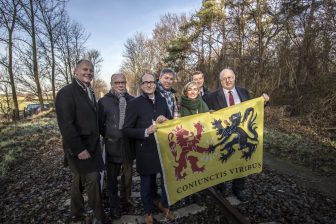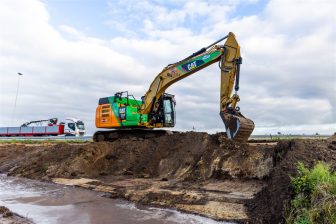IRC Business Plan 2007-2011
Stronger focus on core programme, countries and regions in IRC work from 2007-2011
Delft, The Netherlands – This new Business Plan period will be challenging for IRC and the sector as a whole, as it will determine to what extent the increased international efforts in reaching the MDGs can be turned into sustainable results. This period sets out a new direction for IRC: as an independent and international NGO operating as part of a close and strong coalition of like-minded organisations in the North and South.
IRC will continue its contribution to reaching the MDGs for water supply, sanitation and hygiene. We will do this by strengthening our position and role as a unique information broker, innovator and capacity builder for the WASH sector. By increasing the leverage of our programmes and activities we aim to raise their outcomes and impact.
Main components
To reach these goals, we will implement a strategy which has the following main components:
- A stronger focus in our core programmes and integration of our activities by adopting a country and regional focus to our programmatic and capacity-development work;
- Reinforcing and strengthening our core competences by making a clear separation between our roles as a global information broker and as a development partner in a reduced number of carefully chosen countries and regions;
- The flexible application of different programmatic and organisational modalities for our different roles and the different countries or regions in which we work;
- Actively exploring the use of different types of partnerships at global, regional and national level to create maximum leverage and impact in the sector and for different target audiences.
IRC will structure its activities into two core programmes for the next five years. These are the Global information and learning services (GILS) programme and the National and regional capacity development (NRCD) programme. The first one focuses on accessibility of information, global learning and development of knowledge. The second aims to improve decentralised local governance in WASH and IWRM, with a full integration of capacity building, knowledge development, knowledge sharing and information services.
Both core programmes – although in different combinations – integrate the core competences of IRC, tailored to the needs at the different institutional levels. By shaping the programmes as integrated activities and managing these as such, we will generate more synthesis of our core strengths and competences.
Activities and core programmes
WASH will remain our main area of focus, with some expansion into the water sector at large
In terms of the scope of our activities, IRC will continue to maintain its focus on the water, sanitation and hygiene sector (WASH), while consolidating enlargement of that scope to embrace those elements of water resource management that directly affect poor people and their livelihoods. We will do this in the clear knowledge that sustainable and pro-poor solutions require much more than WASH service provision, and that links to other fields, particularly health, education, utility provision and natural resource management, are therefore essential.
Focus on intermediate levels and local governance
Based on our current work and the experience we have gained, we will continue to focus on local (or community) and decentralised intermediate levels – particularly the latter, where we have identified a critical capacity gap. Where we and our country partners become involved in work at national level – particularly on policy – it will be strictly within the framework of ensuring that the intermediate level functions effectively. One way of seeking leverage in our work is by using partnerships in different modalities. The most appropriate partnership will be shaped by the nature of the activities and the related objectives. This approach means that existing partnerships may continue after being reviewed and adjusted to suit the new objectives and new partnerships will be developed where necessary.
The two core programmes
To give practical expression to the key strategies and activities listed above, within the overall conceptual framework, IRC will structure its activities into two main programmes over the next five years. These are:
- 1. Global Information and Learning Services (GILS): with a focus on accessibility of information, global learning and development of knowledge;
- 2. National and Regional Capacity Development (NRCD): support for decentralised local governance in WASH and IWRM with full integration of capacity building, knowledge development, knowledge sharing and information services.
Both programmes – in different combinations – integrate IRC’s core activities, tailored to needs at the different institutional levels. By shaping the programmes as integrated activities and managing them as such, we will generate more synthesis between our core strengths and competences. The challenge will be to keep the learning cycle going between these two programmes.
Thematic focus
To increase our effectiveness, the activities of the two core programmes will be designed around two focus areas; one on local governance and the other on capacity development and learning. Both focus areas break down into different specific themes and integrate the objective of improving decentralised WASH services.
The focus area on decentralised local governance will include the following (content-related) themes:
- Transparency and good governance;
- Participatory planning and management;
- Financing for sustainable services;
- Multiple use of water (MUS) and local IWRM;
- Hygiene and sanitation.
The focus area on capacity development and learning will be centred on the following (process-related) themes:
- Action research and learning alliances;
- Resource centre development and knowledge sharing;
- Development of communications and information channels.
Both focus areas will include advocacy activities, conceptual development and learning as well as the development and introduction of innovative approaches and methodologies.
It is important to note that not all themes will be dealt with in every country or every regional programme. Depending on context and demand, the relevant themes will be taken up in the different country and regional programmes.
Core activities
Capacity development
To support efforts to strengthen existing sector capacities, and to ensure that they are sustained, IRC and its partners will continue to build on the resource centre approach, and on our growing body of experience as to what works and what does not work. This will imply support for national and regional capacity for better knowledge sharing and information dissemination. An important element of the work will be helping national RC partners to achieve operational sustainability, including sustained financing.
Knowledge development and innovation
IRC will continue to support and catalyse innovation processes that produce country and region-specific knowledge and capacity. However, the focus for these processes will increasingly be identified by our key national and regional partners. Within countries and regions, thematic work will focus on developing tools, processes and advocacy for better local governance and service provision within the WASH sector. This will be supported by a continued global presence in and support for thematic groups at global level.
Information and knowledge services
We will continue to cater for global information based on the existing Source family of newsletters, and IRC’s portal and publications. All of these will be strongly influenced by the regional activities of IRC and its partners, and will serve as a conduit for the ideas and innovations not only of IRC and its partners, but also of other water sector actors. At the same time we will expand our work within regional and national processes to improve the effectiveness of communications and the way information is managed and used.
U las zojuist één van de gratis premium artikelen
Onbeperkt lezen? Profiteer nu van de introductieaanbieding voor € 10,- per maand.
Bent u al abonnee?



